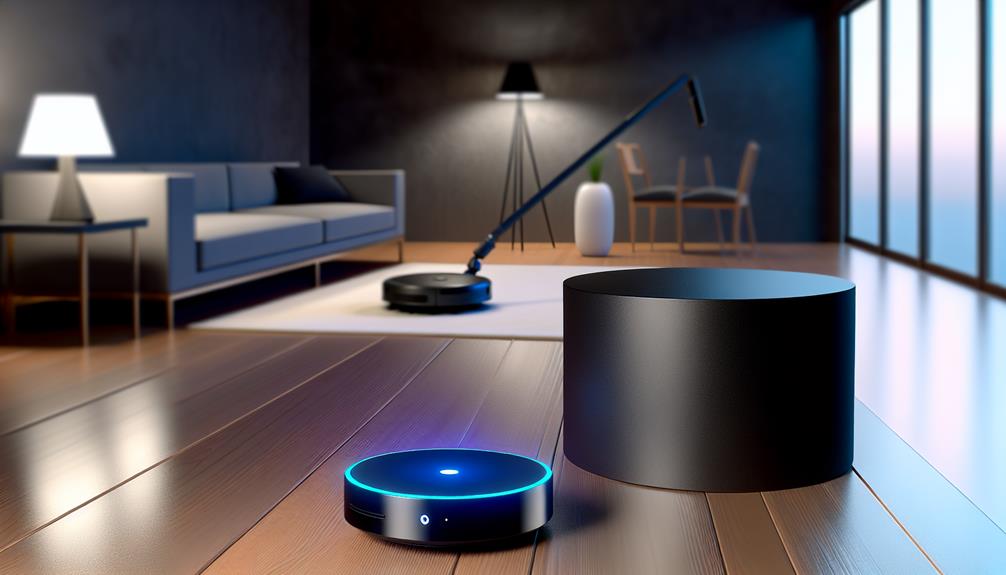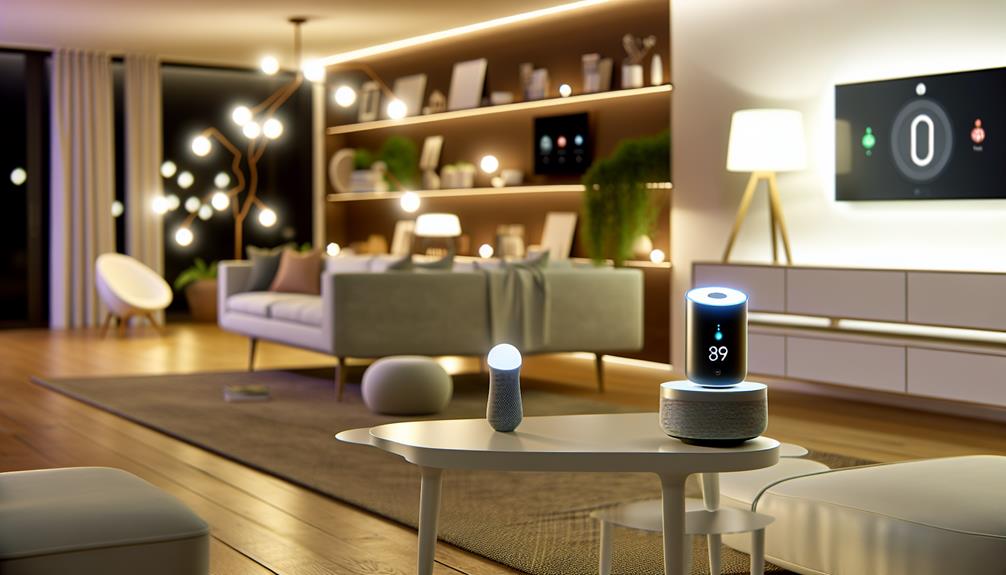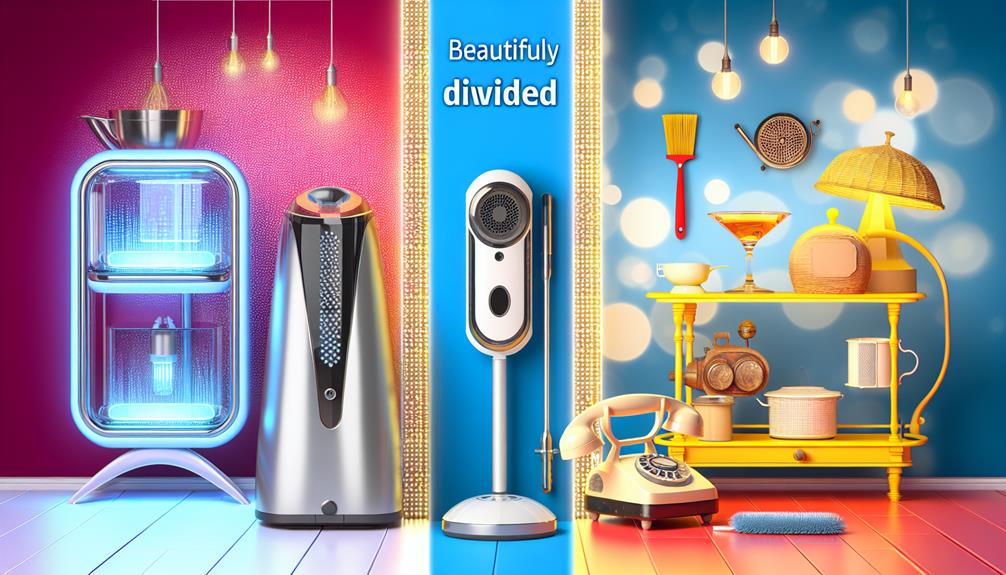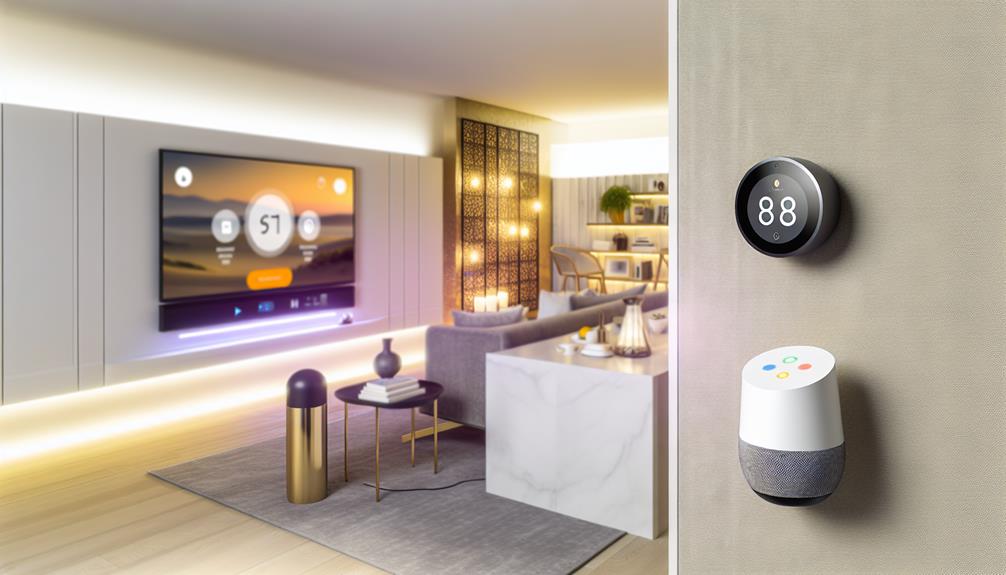Top 5 AI Innovations for Effortless Home Automation
As advancements in artificial intelligence continue to reshape our daily lives, the domain of home automation stands at the forefront of this evolution. The integration of voice-activated smart assistants, intelligent security systems, and automated energy management tools exemplifies how technology can enhance convenience and efficiency within our homes. In addition, innovations in smart lighting and AI-powered appliances are redefining our expectations for domestic living. Yet, the implications of these technologies extend beyond mere convenience, inviting a closer examination of their impact on our lifestyles and the environment. What lies ahead in this transformative landscape?
Key takeaways
- Voice-activated smart assistants enable intuitive interaction, allowing users to control home functions effortlessly through natural language commands.
- Intelligent security systems utilize facial recognition technology, offering enhanced safety and minimizing false alarms while ensuring peace of mind.
- Automated energy management systems optimize energy use and reduce costs via smart thermostats that learn user habits for maximum comfort.
- Smart lighting solutions provide customizable control over brightness and color, enhancing ambiance while reducing energy consumption through automation.
- AI-powered home appliances streamline daily tasks, from cooking to cleaning, by learning user preferences and optimizing processes for convenience.
Voice-Activated Smart Assistants
Voice-activated smart assistants have revolutionized the way we interact with technology in our homes. These sophisticated systems leverage advanced natural language processing to understand and respond to our spoken commands, making daily tasks more convenient and intuitive. With the ability to interpret and process human language, smart assistants can execute a wide range of functions, from adjusting lighting to setting reminders, thereby enhancing our overall living experience.
One of the standout features of voice-activated smart assistants is their capacity for personalized responses. By learning from user interactions, these assistants can tailor their suggestions and actions to fit individual preferences, creating a sense of familiarity and belonging. This personalization fosters a deeper connection between users and their devices, as they begin to feel like integral members of the household.
Moreover, the accessibility of voice activation promotes inclusivity, allowing individuals of varying ages and abilities to engage with technology effortlessly.
As we embrace this innovative advancement, voice-activated smart assistants continue to shape our homes into more responsive, adaptive spaces, ultimately fostering a more cohesive and harmonious living environment. Consequently, they play an essential role in the evolution of home automation.
Intelligent Security Systems
Intelligent security systems represent a significant advancement in home safety, offering robust solutions that integrate cutting-edge technology with user-friendly interfaces. These systems not only provide peace of mind but also foster a sense of community belonging by ensuring a secure environment for families and neighborhoods alike.
One of the most notable features of modern intelligent security systems is facial recognition technology. This innovative capability allows for the identification of familiar faces, minimizing false alarms and alerting homeowners to potential intruders. By recognizing friends and family, these systems enhance trust and safety, making it easier for residents to feel connected and secure in their homes.
Moreover, remote monitoring has transformed the way homeowners oversee their security. With smartphone applications and advanced sensors, users can access real-time footage and receive instant notifications, regardless of their location.
This feature empowers homeowners to take control of their security, ensuring they can respond swiftly to any unusual activity.
Automated Energy Management
A growing number of homeowners are embracing automated energy management systems as a means to enhance energy efficiency and reduce utility costs. These innovative solutions leverage advanced technology, allowing homeowners to monitor and optimize energy consumption in real-time.
At the core of these systems are smart thermostats that learn user habits and adjust temperature settings accordingly, ensuring comfort while minimizing energy waste.
In addition, automated energy management integrates seamlessly with renewable energy sources, such as solar panels, enabling homeowners to maximize their use of clean energy.
Through predictive maintenance, homeowners can anticipate equipment issues before they escalate, ensuring appliances operate at peak efficiency and prolonging their lifespan.
Moreover, demand response features empower homeowners to participate in energy-saving programs offered by utility companies, adjusting their energy usage during peak periods and benefiting from reduced rates.
Smart Lighting Solutions
Smart lighting solutions have revolutionized the way homeowners illuminate their spaces, offering a blend of convenience, energy efficiency, and customization. With the advent of smart bulb technology, individuals can now control the brightness, color, and timing of their lights through intuitive apps or voice commands. This level of control not only enhances the functionality of a home but also fosters a sense of belonging, as families can tailor their environments to suit personal preferences and activities.
Mood lighting is a notable aspect of smart lighting solutions, transforming ordinary spaces into extraordinary experiences. Whether creating a cozy atmosphere for a family gathering or energizing a workspace, smart bulbs can adapt to various scenarios with ease. Homeowners can set schedules, sync lights with music, or even adjust them automatically based on natural light conditions, ensuring that each room reflects the desired ambiance at any time of day.
Moreover, energy efficiency is a key benefit of smart lighting. By utilizing LED technology and automated controls, homeowners can reduce energy consumption considerably, leading to lower utility bills and a smaller carbon footprint.
Embracing smart lighting solutions not only enhances home aesthetics but also contributes to a sustainable lifestyle.
AI-Powered Home Appliances
Homeowners' lives are being transformed by AI-powered home appliances, which bring unprecedented convenience and efficiency to daily tasks. These innovations not only simplify our routines but also create a sense of belonging within our homes.
A smart kitchen, equipped with AI-driven devices, allows for seamless cooking experiences. Imagine smart ovens that adjust cooking times and temperatures automatically, or refrigerators that monitor inventory and suggest recipes based on available ingredients.
Moreover, the rise of robotic vacuums has revolutionized home cleaning. These intelligent devices navigate spaces autonomously, adapting to different surfaces and avoiding obstacles. With integrated AI, they learn the layout of your home, ensuring thorough cleaning without the need for constant supervision.
Together, these AI-powered appliances enhance the modern living experience, offering both time-saving solutions and a touch of luxury. By incorporating such technologies, homeowners can enjoy a harmonious environment that fosters connection, relaxation, and efficiency.
As we embrace these innovations, we not only enhance our homes but also enrich our day-to-day lives, creating spaces that reflect our values and aspirations.
Frequently Asked Questions
How Can I Integrate Different Smart Devices in My Home?
Imagine a symphony where each instrument harmonizes perfectly. To achieve seamless integration of smart devices, prioritize smart home ecosystems that guarantee device interoperability, enabling enhanced communication and collaboration among your technology for a cohesive living experience.
Are AI Innovations Compatible With Older Home Technology?
AI innovations can present compatibility issues with legacy systems, as older technologies may lack the necessary interfaces. However, with appropriate adapters or integration solutions, many legacy devices can still benefit from modern AI enhancements, fostering seamless connectivity.
What Are the Privacy Concerns With Smart Home Devices?
Privacy concerns with smart home devices primarily revolve around data security and user consent. Insufficient safeguards can lead to unauthorized data access, while users often lack transparency regarding how their information is collected and utilized.
How Much Does Setting up Home Automation Typically Cost?
Starting on the journey of home automation often involves a modest investment in initial setup, typically ranging from $500 to $2,000. Additionally, ongoing maintenance costs should be considered to guarantee seamless functionality and continued satisfaction.
Can I Control My Smart Home Remotely While Traveling?
Yes, you can control your smart home remotely while traveling, enhancing your travel convenience. Remote access allows you to manage appliances, security systems, and lighting, ensuring peace of mind and comfort wherever you are.



